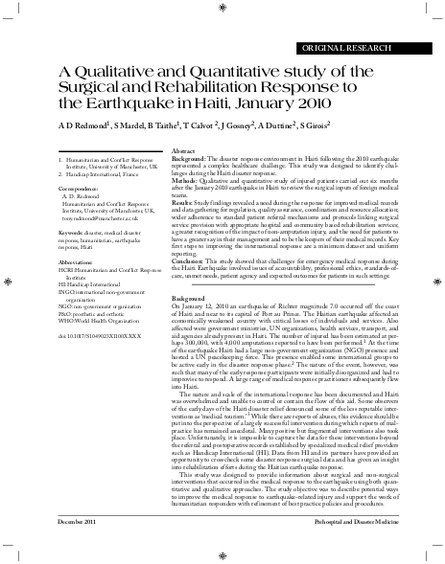
Background: The disaster response environment in Haiti following the 2010 earthquake represented a complex healthcare challenge. This study was designed to identify challenges during the Haiti disaster response.
Methods: Qualitative and quantitative study of injured patients carried out six months after the January 2010 earthquake in Haiti to review the surgical inputs of foreign medical teams.
Results: Study findings revealed a need during the response for improved medical records and data gathering for regulation, quality assurance, coordination and resource allocation; wider adherence to standard patient referral mechanisms and protocols linking surgical service provision with appropriate hospital and community based rehabilitation services; a greater recognition of the impact of non-amputation injury, and the need for patients to have a greater say in their management and to be the keepers of their medical records. Key first steps to improving the international response are a minimum dataset and uniform reporting.
Conclusion: This study showed that challenges for emergency medical response during the Haiti Earthquake involved issues of accountability, professional ethics, standards-of-care, unmet needs, patient agency and expected outcomes for patients in such settings:
Links
Resource collections
- Earthquakes
- Learning from crises
- Topics
- UN Habitat - Urban Response Collection
- Urban Response - Urban Crisis Preparedness and Risk Reduction
- Urban Response Collection - Community Engagement and Social Cohesion
- Urban Response Collection - Economic Recovery
- Urban Response Collection - Environment and Climate Change
- Urban Response Collection - Housing, Land and Property
- Urban Response Collection - Urban Crisis Response, Recovery and Reconstruction
- Urban Response Collection - Urban Resilience
